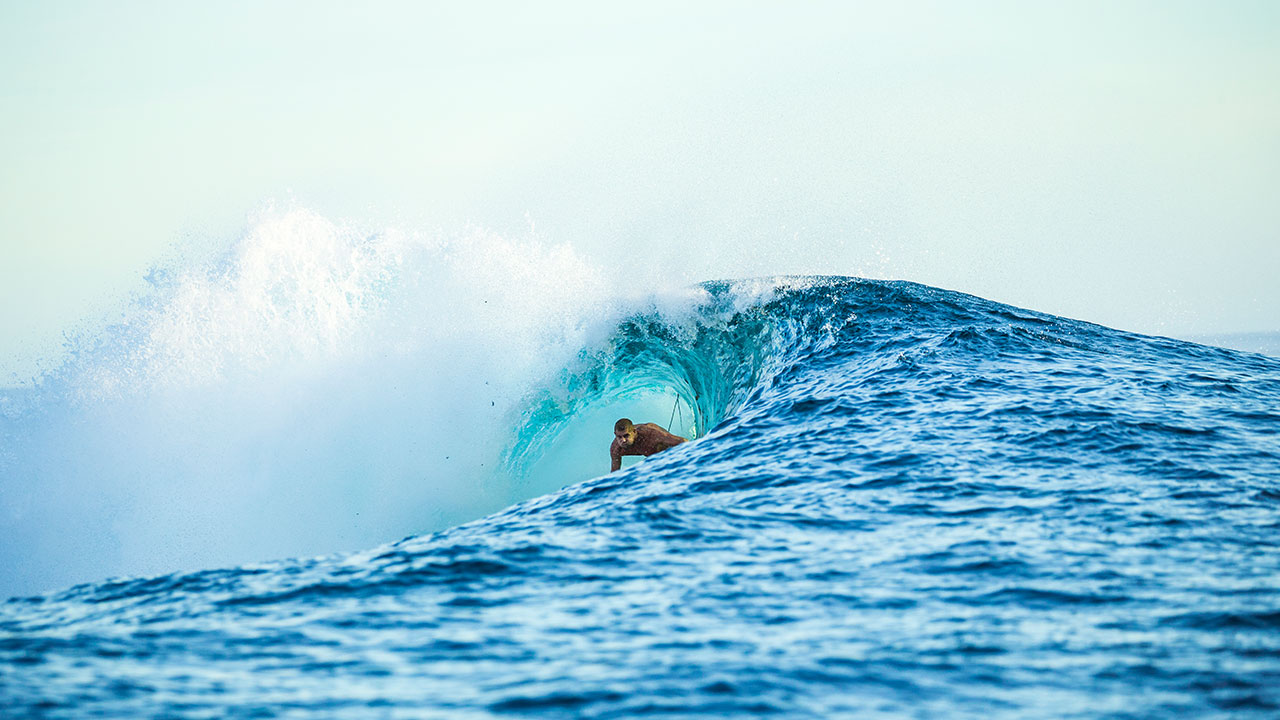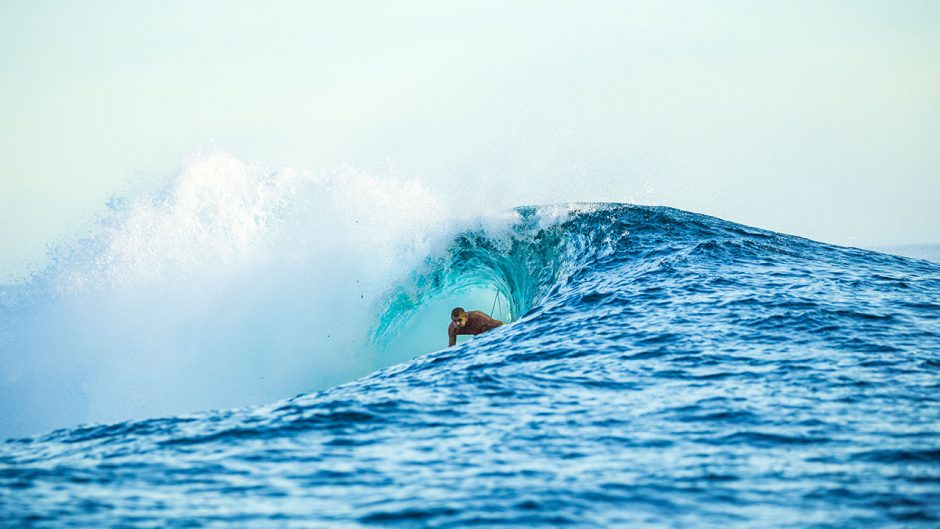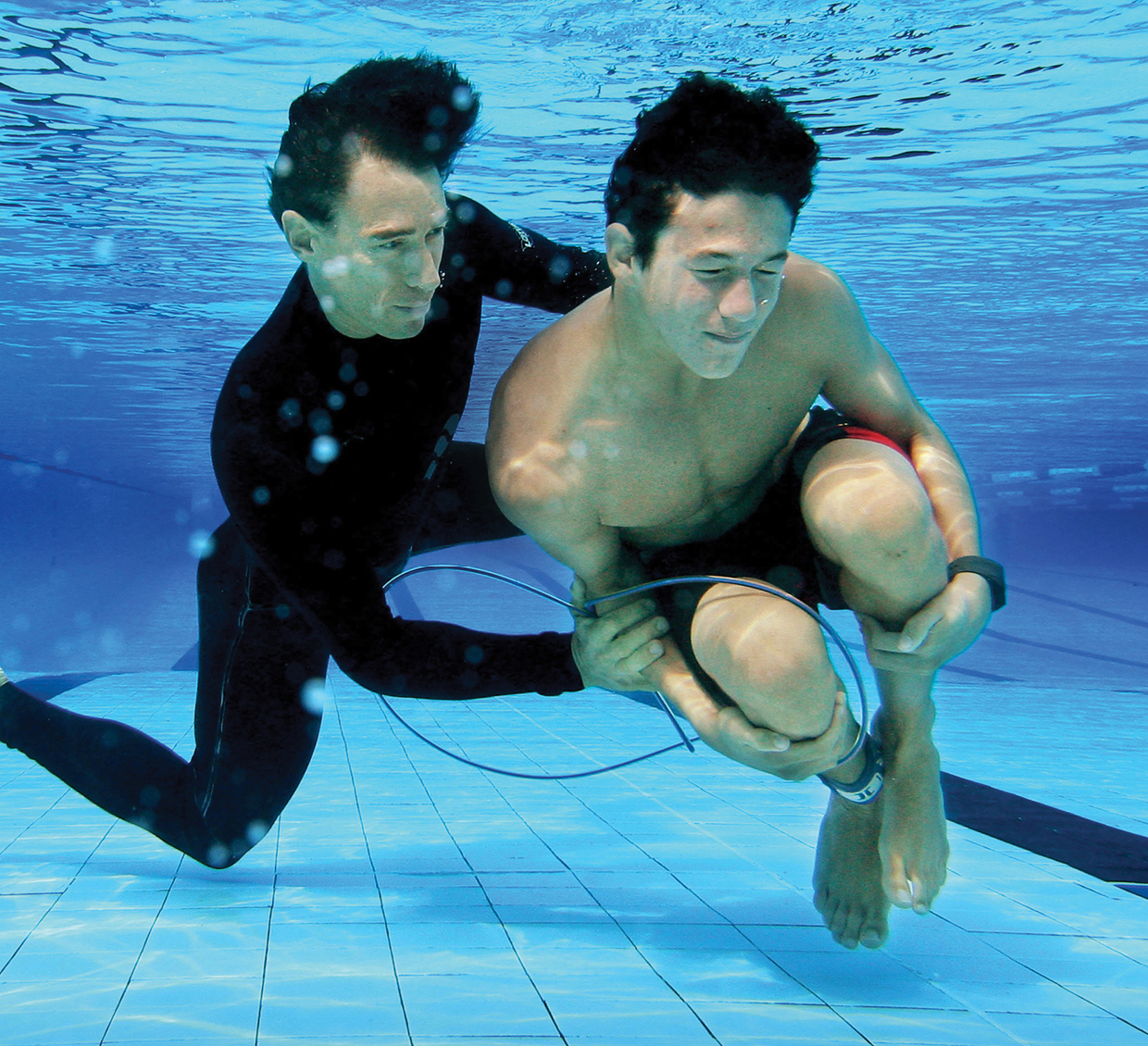Inside The Mind Of Mick Fanning’s Breath Trainer, Nam Baldwin
Video: Breath Enhancement Training / bettraining.com
Mick Fanning was one of the main pushers for change in surfing. He was one of the first men on the World Tour to really start training, and taking that training very seriously. He is an athlete, and he has lived his life like one.
And over the past decade, he’s pushed that even further – beyond just physical strength – and it’s the realms of breath training, cryo-therapy and beyond. One of the men who has helped him do this is his trusted trainer, Nam Baldwin.
Nam is known as one of the world’s most well respected trainers in breathing, and he teaches his techniques to everyone from elite athletes to CEOs. We caught up with him a few weeks back and asked… why? What is the secret?
Nam, can you explain to us how you got to where you are today? What inspired you to take this path?
It was growing up in South Africa. I’m not South African, but I lived there when I was younger, and it was during Apartheid. What I found was a lot of suffering around me – black and white segregation everywhere – and it was all a bit weird for me as a kid. Without going into graphic details, as a kid in that area in that time, you saw hardship. You saw some pretty bad stuff happen.
My dad was a Diplomat and his role was trying to get countries to unite and work better together. I was born in England and he was a British Diplomat in South Africa, and had lived there since the ‘60s. He was trying to bring the relationship between Great Britain and South Africa into a better light. Through that I was taught a lot, at a very young age, about value systems – what you stand for. All around me were people who were very strong in their views and what they believed in –I was constantly being educated about what a belief really is. I started to learn so much about what it means to be a human – what it means to be an individual – and what you stand for.
The school I went to was very disciplined and we faced tough consequences if we didn’t perform well or stepped out of line. As a consequence my family became a very strong base of support for me plus we all found that sport was a great outlet for the pressure we experienced. In South Africa at that time, they still allowed teachers to beat you if you misbehaved or even if you weren’t performing well in certain sports. For example, in cricket practice if you missed three catches you were beaten. That stuff happened a fair bit and it drilled into you that performance is a very important thing. Getting beaten by your own cricket bat meant that you either suffered of you learnt how to perform well under pressure.
At that early age too, one of my best mates had a gardener that was really good at karate. He was an expert, and he taught me about breathing. I was only a kid, but he was so good at showing us things. He was a black South African, so he was living in a very challenging environment – but he was so kind to us, and so giving with his information. That was quite appealing – that this guy who was living in this harsh environment where he couldn’t get on the same bus as me, he couldn’t sit on the same bench in a park with me, yet here he was teaching me these things about life that are so… good. It was a very deep emotional connection to this guy. And I thought, how crazy is this place? That it’s so against black South Africans, yet here is this man being so liberal with his knowledge and so kind to us.
So I learnt a lot about:
A. Performing under pressure, because I was put under so much pressure as a kid in sport.
B. What it’s like to live in an environment where you’re separated because of the colour of your skin. I really dove into what I valued and my judgement of things at an early age. It wasn’t acceptable, and I didn’t agree with what was happening at the time. I was learning through my own experiences that people’s behaviour and how they perform is very much driven by their values.
C. That breathing was the foundation for high performance (taught by the coloured karate teacher). I was a competitive kid and would do anything for an “edge”. Breathing better allowed me to handle pressure better, such as intense 400m sprint races or playing in the cricket team where dropping the ball meant a beating. From way back then I have studied and researched the benefits of better breathing around stressful situations.
That’s so interesting that at such a young age you were able to understand that breathing was the key to regulating your levels of performance. Most kids probably wouldn’t even think about it.
It was fascinating to look back on and realise how those tough moments have shaped much of what I think about and how I perform today. Thanks for the question!
I saw an interview you did a while back and you said that the main similarity across all athletes that you train is the drive to do well – and it sounds like that was what your childhood was like.
In some ways I think that all high-performance athletes have something in their background that pushed them – whether that be adversity or wanting to be as good as someone else, or that their environment was threatening. I think that drive to do well, to excel further than anyone else, stems from something like that.
How does stress, breathing and performance all correlate?
So stress, or pressure, comes from three things – expectation and scrutiny – whether that’s within you or from others, and whether it’s perceived or real. And then there’s consequence. If I win this, it means this – if I lose this, it means this. So that equates to a sense of stress. Chemically a lot of things happen when a person is under stress.
When you go into a fight/flight response, breathing is one of the only natural ways to assist in regulating your nervous system. By breathing better i.e. evenly and rhythmically, you start to regulate how your heart beats and this then sends signals via various pathways to your brain and tells it that you have some form of self-regulation. This then helps to regulate the fight/flight response.
So breathing is like a regulator. It determines how far you go down the fight or flight path. Or if you are down there already, breathing will assist you to maintain better composure. Therefore things like motor skills and decision making are easier to access.
So that would translate into a pressure situation like a heat or in big surf. But does the breathing actually give your body physical benefits, beyond the mental and chemical benefits?
Does breathing give your body extra oomph? When we breathe with the full use of our lungs, the amount of oxygen that we take in is greater than if we were to shallow breathe through the upper part of our chest. If I’m shallow breathing I might get about 4mil of oxygen per minute, give or take. If I use the entirety of my lungs that can jump to 60. And what my brain is looking for in those moments is oxygen, because oxygen is the fuel that provides me energy, and therefore the ability to use my body more effectively. So if I’m breathing better, in any stressful situation, I am feeding my body what it primarily wants – oxygen and blood flow.
So it helps you physically by helping you mentally.
Yes and vice versa – if you want better mental control you can always start with a physical aspect, such as breathing. This will assist your ability to think clearer, make better decisions and have better physical control.
And have you incorporated doing this sort of stuff into Mick’s training as well?
We have done a lot of breath work, in the pool in particular. That involves heightened stress responses and deep parasympathetic responses too. Getting him to calm down to a point where his breathing rate is comfortably at one to two breath cycles a minute. Getting him to work in that space. And then again, challenging the body with low levels of oxygen and high amounts of carbon dioxide. That’s all breath related, so that his body has the ability to deal with high-pressure situations in so many dynamic ways.
You’ve worked with Mick for a really long time. You’ve seen him go through so much over the last couple of years. Have you noticed, as he’s faced more challenges, that he’s taken more from what he’s learnt and been very conscious of the fact that it’s helped?
We think about it in terms of mindset. Having a really open mindset. He’s all about learning and observing as many methods as he can, and discovering the recipes that allow him to perform and think better. That’s a lot of what I’ve seen in Mick. He takes on stuff and he’ll go to new things. He’s a leader in that way – especially in surfing. Exercise, training – he was the first guy to really knuckle down with that. And it was before my time with him too, but that’s what I’ve noticed. That’s partly why he came to me because he thought, wow there must be something in this because people are talking about it.
He’s so open. And that’s one of the gifts I guess he could share with other people. Be open. Be willing to learn. And use what happens – whatever happens, use it. Don’t let it use you.
The effects of his training are so visible. He’s gone through so much and been put in so many situations where most people would have absolutely cracked. And he hasn’t.
Yeah, and he does work with other people – I’m not going to pretend to take the full credit. But again, it’s that openness and willingness to observe. He’s also become very self-aware too, which is a notable quality of a great athlete. High levels of self-awareness, understanding what works and what doesn’t, and applying yourself to a process.

There’s no risk of Mick Fanning running out of puff
This post was originally on…



